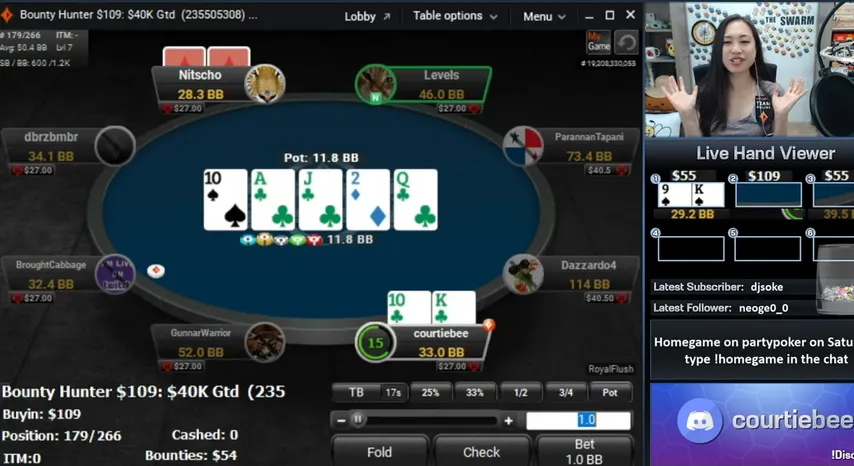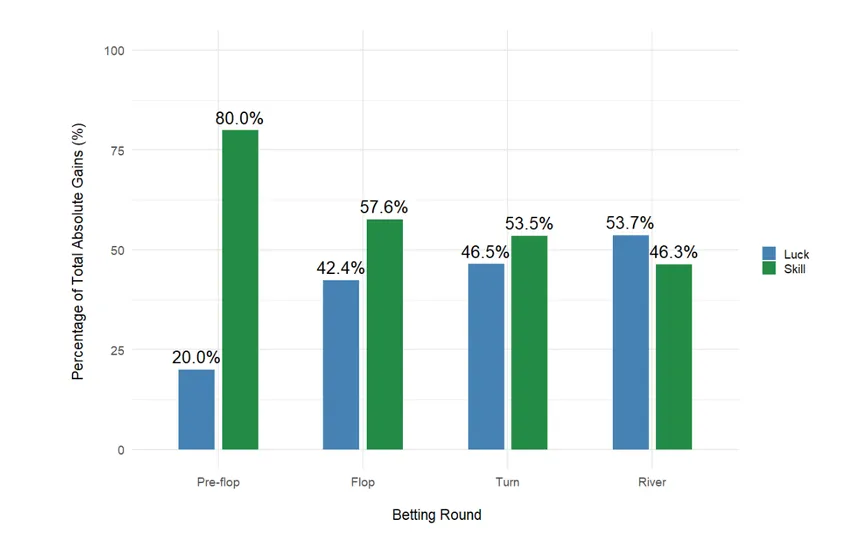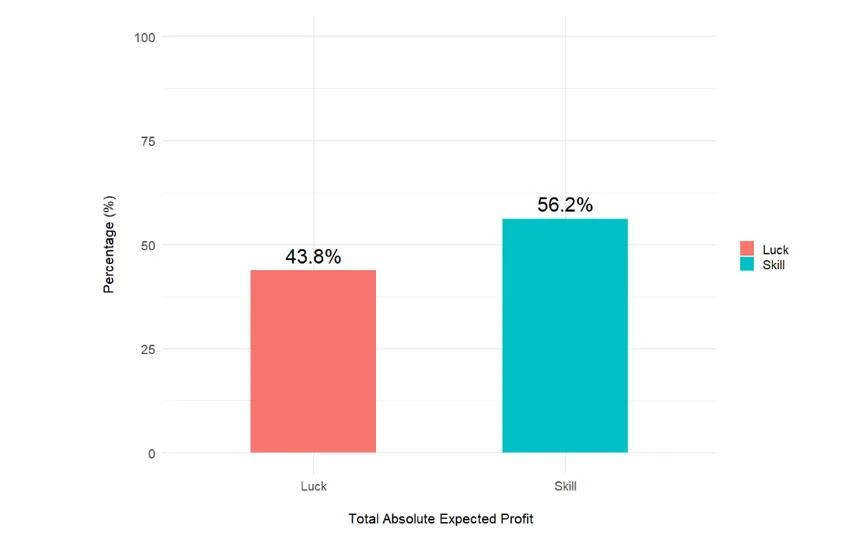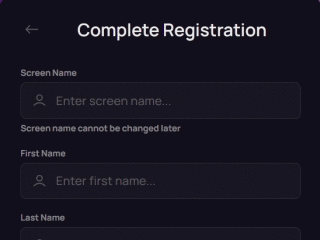"Poker is just about luck."
This is one of the things you often hear from someone who doesn't play (or has just taken a bad beat). To many people, luck feels like a defining factor in poker. From their perspective, the winner is just the most fortunate player of the session.
Is it luck or skill that makes more profit in poker? Those who don't play, feel luck is in control. Some feel it's all skill, but most veteran players would say the two elements mix.
It's been a longstanding debate. A recent paper by Mingzhe Xu at the University of California, Los Angeles aimed to shed some light on the discussion.
What the Paper Aimed to Explain
We'll be simplifying the findings of Quantification of Luck and Skill in Poker Via Simulations and Expected Value Computation by Mingzhe Xu. His peer-reviewed 2024 study is part of a Master of Applied Statistics and Data Science degree. As Xu states in the abstract, "This paper aims to address this debate through a rigorous statistical analysis that both defines and quantifies luck and skill in Texas Hold'em."
The goal was to examine real poker hand data and compute the expected profit attributed to either luck or skill for the players at each betting round. This would allow patterns to be discovered and meaningful insights derived about the balance of luck and skill.
For poker players, getting this info about each betting round could be a game-changer, or at the very least, eye-opening. We all have our intuitions about luck and skill in poker. We usually don't have a master's degree thesis paper to read on the topic.

How Xu Aimed to Prove His Thesis
The study examined "obfuscated real-world poker game hand histories" and computed "the expected profit attributed to either luck or skill for the players at each betting round." The paper constantly refers to expected profit, which means the increase in equity, minus any expenses for the round. This is the metric Xu used to measure luck and skill.
- How the study defines luck:
Specifically, the study defined luck as the changes in player expected profit due to card dealing. - How the study defines skill:
Skill was defined as expected profit changes resulting from player betting decisions.
Simulations were run to calculate the probabilities of different outcomes at each stage. These hand histories were bought from a 3rd party company that observes online poker games. Various visualizations were then used to compare the aggregated results, highlighting patterns or trends.
- GipsyTeam's unique promotions
- Help with deposits and cashouts
- Access to private freerolls
- Round-the-clock support
- GipsyTeam's unique promotions
- Help with deposits and cashouts
- Access to private freerolls
- Round-the-clock support
- GipsyTeam's unique promotions
- Help with deposits and cashouts
- Access to private freerolls
- Round-the-clock support
- Уникальные акции от GipsyTeam
- Помощь с депозитами и кешаутами
- Доступ в закрытые фрироллы
- Круглосуточная поддержка
- Уникальные акции от GipsyTeam
- Помощь с депозитами и кешаутами
- Доступ в закрытые фрироллы
- Круглосуточная поддержка
- GipsyTeam's unique promotions
- Help with deposits and cashouts
- Access to private freerolls
- Round-the-clock support
- Уникальные акции от GipsyTeam
- Помощь с депозитами и кешаутами
- Доступ в закрытые фрироллы
- Круглосуточная поддержка
- GipsyTeam's unique promotions
- Help with deposits and cashouts
- Access to private freerolls
- Round-the-clock support
- GipsyTeam's unique promotions
- Help with deposits and cashouts
- Access to private freerolls
- Round-the-clock support
- GipsyTeam's unique promotions
- Help with deposits and cashouts
- Access to private freerolls
- Round-the-clock support
- GipsyTeam's unique promotions
- Help with deposits and cashouts
- Access to private freerolls
- Round-the-clock support
- GipsyTeam's unique promotions
- Help with deposits and cashouts
- Access to private freerolls
- Round-the-clock support
- GipsyTeam's unique promotions
- Help with deposits and cashouts
- Access to private freerolls
- Round-the-clock support
- GipsyTeam's unique promotions
- Help with deposits and cashouts
- Access to private freerolls
- Round-the-clock support
- GipsyTeam's unique promotions
- Help with deposits and cashouts
- Access to private freerolls
- Round-the-clock support
- GipsyTeam's unique promotions
- Help with deposits and cashouts
- Access to private freerolls
- Round-the-clock support
- GipsyTeam's unique promotions
- Help with deposits and cashouts
- Access to private freerolls
- Round-the-clock support
- GipsyTeam's unique promotions
- Help with deposits and cashouts
- Access to private freerolls
- Round-the-clock support
- GipsyTeam's unique promotions
- Help with deposits and cashouts
- Access to private freerolls
- Round-the-clock support
- GipsyTeam's unique promotions
- Help with deposits and cashouts
- Access to private freerolls
- Round-the-clock support
- GipsyTeam's unique promotions
- Help with deposits and cashouts
- Access to private freerolls
- Round-the-clock support
- GipsyTeam's unique promotions
- Help with deposits and cashouts
- Access to private freerolls
- Round-the-clock support
- Уникальные акции от GipsyTeam
- Помощь с депозитами и кешаутами
- Доступ в закрытые фрироллы
- Круглосуточная поддержка
- GipsyTeam's unique promotions
- Help with deposits and cashouts
- Access to private freerolls
- Round-the-clock support
- GipsyTeam's unique promotions
- Help with deposits and cashouts
- Access to private freerolls
- Round-the-clock support
- GipsyTeam's unique promotions
- Help with deposits and cashouts
- Access to private freerolls
- Round-the-clock support
- GipsyTeam's unique promotions
- Help with deposits and cashouts
- Access to private freerolls
- Round-the-clock support
- GipsyTeam's unique promotions
- Help with deposits and cashouts
- Access to private freerolls
- Round-the-clock support
- GipsyTeam's unique promotions
- Help with deposits and cashouts
- Access to private freerolls
- Round-the-clock support
- Уникальные акции от GipsyTeam
- Помощь с депозитами и кешаутами
- Доступ в закрытые фрироллы
- Круглосуточная поддержка
- GipsyTeam's unique promotions
- Help with deposits and cashouts
- Access to private freerolls
- Round-the-clock support
- GipsyTeam's unique promotions
- Help with deposits and cashouts
- Access to private freerolls
- Round-the-clock support
- Уникальные акции от GipsyTeam
- Помощь с депозитами и кешаутами
- Доступ в закрытые фрироллы
- Круглосуточная поддержка
- GipsyTeam's unique promotions
- Help with deposits and cashouts
- Access to private freerolls
- Round-the-clock support
- Уникальные акции от GipsyTeam
- Помощь с депозитами и кешаутами
- Доступ в закрытые фрироллы
- Круглосуточная поддержка
- Уникальные акции от GipsyTeam
- Помощь с депозитами и кешаутами
- Доступ в закрытые фрироллы
- Круглосуточная поддержка
- GipsyTeam's unique promotions
- Help with deposits and cashouts
- Access to private freerolls
- Round-the-clock support
- GipsyTeam's unique promotions
- Help with deposits and cashouts
- Access to private freerolls
- Round-the-clock support
- GipsyTeam's unique promotions
- Help with deposits and cashouts
- Access to private freerolls
- Round-the-clock support
- Уникальные акции от GipsyTeam
- Помощь с депозитами и кешаутами
- Доступ в закрытые фрироллы
- Круглосуточная поддержка
- GipsyTeam's unique promotions
- Help with deposits and cashouts
- Access to private freerolls
- Round-the-clock support
- GipsyTeam's unique promotions
- Help with deposits and cashouts
- Access to private freerolls
- Round-the-clock support
- GipsyTeam's unique promotions
- Help with deposits and cashouts
- Access to private freerolls
- Round-the-clock support
- GipsyTeam's unique promotions
- Help with deposits and cashouts
- Access to private freerolls
- Round-the-clock support
- Уникальные акции от GipsyTeam
- Помощь с депозитами и кешаутами
- Доступ в закрытые фрироллы
- Круглосуточная поддержка
- GipsyTeam's unique promotions
- Help with deposits and cashouts
- Access to private freerolls
- Round-the-clock support
- GipsyTeam's unique promotions
- Help with deposits and cashouts
- Access to private freerolls
- Round-the-clock support
The paper included hands from a whopping sample size from three different Texas Holdem stakes:
- 17.25 million hands at NL50 from 212,224 players
- 6.79 million hands at NL200 from 64,262 players
- 2.87 million hands at NL1000 from 18,596 players
However, far fewer hands were used in the final results. It's a huge expense to analyze and organize the data from each one, meaning only 277 hands were obtained from the dataset. They were played between December 2008 and April 2009.
There were a couple of criteria:
- Hands must have 4 betting rounds and play until showdown.
- Hands must have exactly two players remaining at showdown.
So, Does Luck or Skill Affect Expected Profit More?
Some may think of luck (or variance) as a constant force, with equal influence over the flop, turn, and river. However, the findings showed a dynamic shift in the influence of luck and skill as the betting rounds progressed:
- Preflop: "Initially, in the pre-flop round, skill is dominant, contributing approximately 80% of the total absolute expected profit."
- Flop: "In the flop round, with three community cards revealed, the influence of luck increases to 42.4%"
- Turn: "During the turn round, with a fourth community card, the contributions of luck and skill become nearly balanced, at 46.5% and 53.5%, respectively."
- River: "In the final river round, luck surpasses skill, accounting for 53.7% of the total expected profit."

Overall, taking all four rounds into account, skill accounts for 56.2% of the expected profit, compared to 43.8% for luck. Surprising no professional or regs, the paper states, "In our analysis, skill appears to play a more important role in winning Texas Hold’em games."

The average expected profit per hand also increased significantly from the pre-flop to river, rising from $19 to $60.36 for luck and $4.76 to $52.12 for skill. This reflects the compounding effects of earlier strategic decisions.
Mingzhe Xu summarized the paper's results:
"Our analysis demonstrates that Texas Hold'em is a complex game where both luck and skill play significant roles. Skilled players can leverage their strategic insights to maximize their expected profits, but the element of luck ensures that even less experienced players have a chance to win."
A Couple of Drawbacks to Think About
The study had some limitations, such as only analyzing 277 hands and not fully accounting for cases with more than two active players per round. The study also admits that a more advanced way to define luck and skill may be needed. Apparently, analyzing a single hand takes around 10 minutes of computing, which limited the sample size.
Another notable drawback is that the hand histories are taken from between December 2008 and April 2009. It's reasonable to suggest that the average skill level of a poker player in 2024 and beyond is higher than in 2008-2009. This may mean that luck becomes slightly less of a factor, as players use strategies that are less affected by dealt cards.
Even with its self-proclaimed drawbacks, the study highlights and defines something that feels intangible. It builds on previous work in this area, but it won't be the last word.
You can read the paper in its entirety online, for free.
If you want a free way to learn poker and develop skills, we recommend checking our freeroll schedule.



























